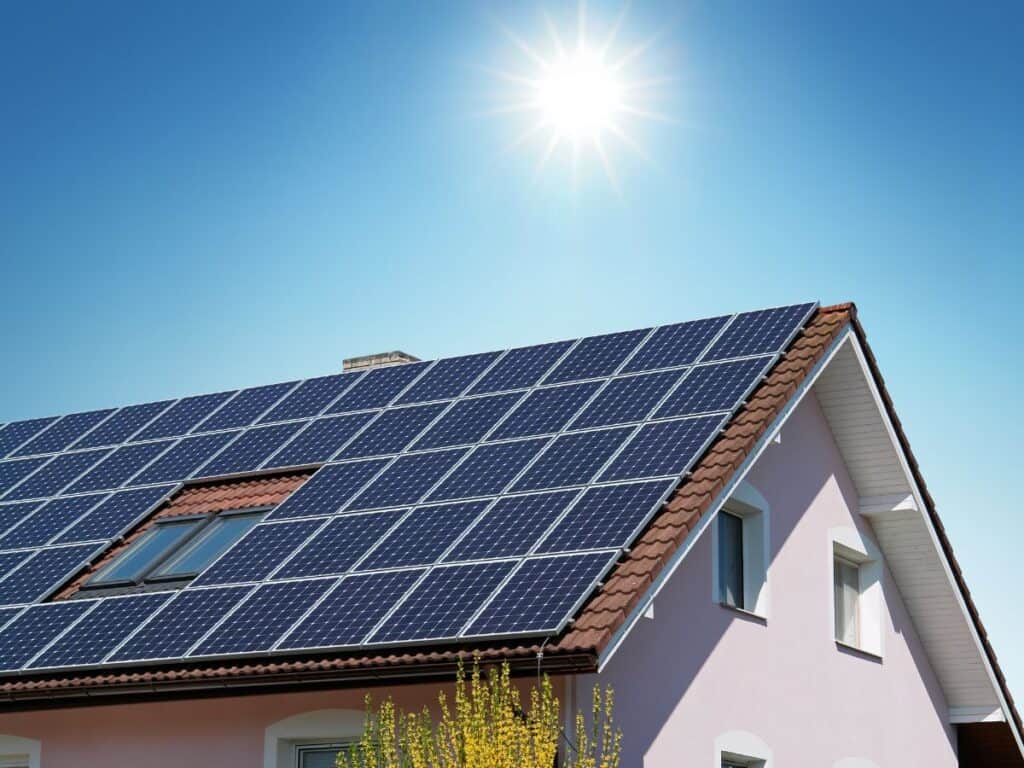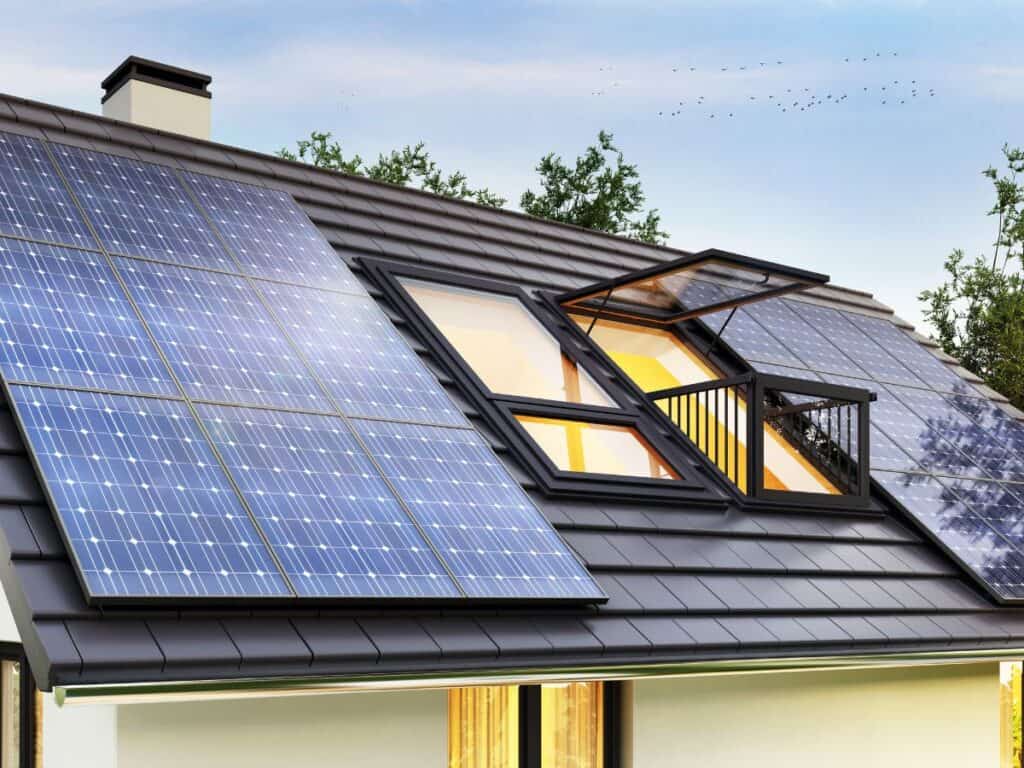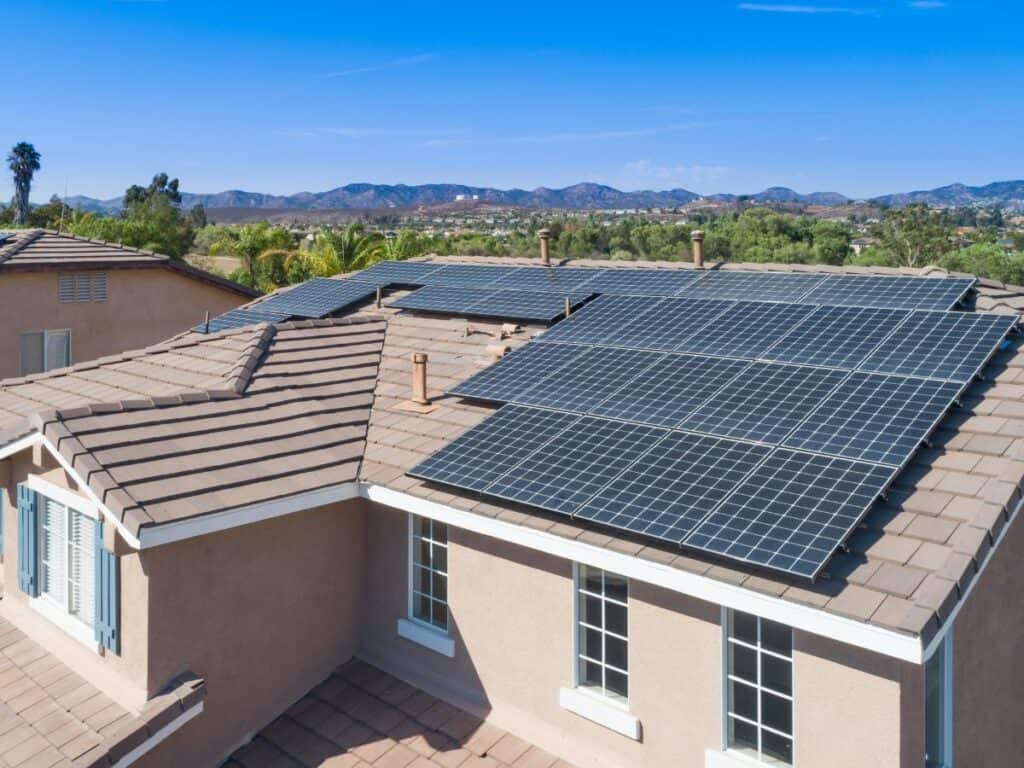When I first decided that I wanted to install solar panels my biggest concern was whether or not it would be financially viable. I mean, you don’t want to invest thousands of dollars only to have to do it again in a few years time.
That lead me to ask how long do solar panels last.
On average, solar panels have a lifespan of 25 to 30 years. However, sometimes they can last longer. Many solar panels continue to generate electricity well after 30 years but at a lower efficiency. The lifespan of solar panels is influenced by environmental factors such as temperature, humidity, and exposure to sunlight as well as the quality of materials they are made out of and how they are made.
Even though solar panels can keep producing power beyond 25 to 30 years it’s important to note that they will not produce full power for the entire life of the panel (Although this is how you can increase the power solar panels produce).
What do I mean by that?

How fast do solar panels lose power?
Solar panel manufacturers typically provide a performance warranty that guarantees a certain level of output over a specified period, often 25 years.
The industry standard degradation rate for solar panels is around 0.5% per year. That means that after 25 years, the solar panel should still perform at around 87.5% of its original capacity. However, some high-quality panels have even lower degradation rates, ensuring better long-term performance.
If you invest in good quality solar panels to start with, and maintain them properly over the years Your solar panels will live up to their life expectation.
Let’s now look at some of the factors that impact the longevity of solar panels…
What are the factors that impact the lifespan of your solar panels?
In my experience, there are 7 main things that can have an impact on how long your solar panels last.
- Quality of Materials
- Manufacturing Techniques
- Environmental Factors
- Installation Quality
- Electrical Components
- Usage and Load
- Following Manufacturer Guidlines
Let’s now dig into each one in detail to see what we can do to make our solar panels last longer…
Quality of Materials
The quality of the materials used in the manufacturing of solar panels plays a crucial role in determining their lifespan.
High-quality panels with durable components and robust construction tend to have a longer lifespan.
Manufacturing Techniques:
The manufacturing process of solar panels is essential in ensuring their longevity. Proper quality control measures, adherence to industry standards, and reliable manufacturing techniques contribute to the overall quality and durability of the panels.
Environmental Factors:
Environmental conditions can significantly affect the lifespan of solar panels. Extreme weather events like heavy snowfall, exposure to saltwater or hailstorms can cause physical damage to the panels. High temperatures, humidity, and prolonged exposure to UV radiation can accelerate wear and tear. Therefore, the climate and geographical location where the panels are installed are important considerations.
Installation Quality:
Proper installation techniques and practices are vital for the long-term performance of solar panels. Incorrect or substandard installations can lead to issues like water leakage, loose connections, or insufficient support, which may negatively impact the panels’ lifespan.
Electrical Components:
The electrical components of the solar power system, including inverters and wiring, can also affect the overall lifespan of the panels. Proper selection, installation, and regular maintenance of these components are crucial to avoid potential issues and ensure the panels’ longevity.
Usage and Load:
The usage patterns and load placed on solar panels can impact their lifespan. Excessive stress due to overloading or irregular usage can accelerate wear and reduce efficiency over time. Balancing energy consumption and load management is important for maintaining the panels’ performance and lifespan.
Following Manufacturer Guidelines:
It is important to adhere to the installation guidelines provided by the manufacturer of your solar panels. If these guidelines are not followed they could have an impact on any warranty claims you may have.
If you invest in high-quality panels, make sure they’re installed correctly by professionals when you first invest in your solar panels, and then maintain and clean them regularly, it is possible to maximize the lifespan of solar panels and optimize their long-term performance.

What can you do to extend the life of your solar panels?
Once your panels are installed you can extend their life by maintaining them correctly.
To extend the life of your solar panels and optimize their performance, here are some tips that I have found useful.
1. Inspect your solar panels regularly
Conduct periodic inspections of your solar panels to identify any signs of damage, loose connections, dirt or other issues. Promptly address and repair any problems to prevent further damage and ensure optimal performance.
2. Clean your solar panels regularly
Keep the surface of your solar panels clean and free from dirt, dust, leaves, or any other debris that may accumulate over time. This can be done using a soft brush or sponge with a gentle cleaning (Like diluted vinegar) solution and rinsing with water. However, be cautious and follow any specific cleaning instructions provided by the manufacturer.
3. Monitor Performance:
Keep an eye on the performance of your solar power system by regularly monitoring its output. Many solar systems come with monitoring tools or software that provide real-time data on energy production. Monitoring helps identify any potential issues or deviations from expected performance, allowing for timely action and maintenance.
4. Protect from Extreme Conditions:
Take steps to protect your solar panels from extreme weather conditions. For example, if you live in an area prone to hailstorms, consider installing protective measures such as hail guards or choosing panels with higher durability ratings. Similarly, in regions with heavy snowfall, ensure proper snow removal to prevent excessive weight on the panels.
5. Maintain Proper Ventilation:
Ensure that there is adequate airflow around your solar panels. Proper ventilation helps dissipate heat and maintain optimal operating temperatures, reducing the risk of thermal stress and potential damage to the panels.
6. Be Mindful of Surrounding Vegetation:
Trim any nearby trees or vegetation that may cast shadows on your solar panels, as shading can significantly impact their performance. Ensure that the panels receive maximum sunlight exposure throughout the day.
I try and do these checks once a month to pick up and fix any minor issues before they can develop into something major.
So not that we know how long your solar panels should last, how to make sure they’re installed correctly, and what we can do to make them last longer, what happens after they’ve been on your roof for two or 3 decades?

What happens after 25 years of solar panels?
After 25 to 30 years your solar panels typically continue to function and generate electricity but their performance will have degraded over time.
Here’s what you can expect after the 25-year mark:
Decreased Efficiency:
Solar panels experience a natural degradation process, which results in a gradual reduction in efficiency. While the industry standard degradation rate is around 0.5% per year, it can vary depending on the quality of the panels. After 25 years, the panels are expected to perform at approximately 87.5% of their original capacity.
Reduced Output:
As the efficiency declines, solar panels may produce slightly less electricity compared to their initial years of operation. This decrease in output may be more noticeable if you closely monitor the energy production over time.
Warranty Coverage:
Most solar panel manufacturers provide performance warranties that guarantee a certain level of electricity production over a specified period, typically 25 years. However, after this period, the performance warranty may expire, and any issues or maintenance required will no longer be covered by the manufacturer.
Continued Operation:
While the efficiency and output may decrease, solar panels will still continue to produce electricity. They can still contribute to offsetting your energy consumption and reducing your reliance on the grid.
Upgrades or Replacement:
After the 25-year mark, you may consider options for upgrading or replacing your solar panels. Newer technologies and advancements may offer higher efficiency and better performance. Upgrading or replacing the panels can help restore or improve the system’s energy generation capacity.
End-of-Life Considerations:
At some point, typically beyond the 25-year mark, solar panels reach the end of their useful life. At this stage, proper disposal or recycling is essential to minimize environmental impact. Many solar panel manufacturers and recycling companies offer recycling programs to ensure the proper handling of retired panels.
So in conclusion, even though the initial investment upfront may be sizeable, you will get many years of trusty service from your solar panels. If you look after your solar panels, they’ll look after you and your power needs for many years to come.
